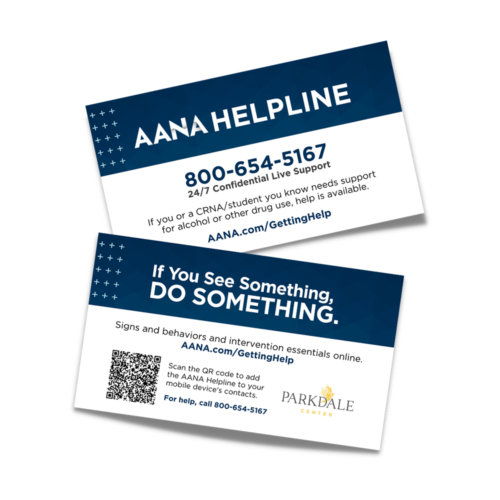Where to Get Help
Helpful Resources
AANA Peer Assistance and Wellness in the Workplace
AANA Peer Assistance and Wellness in the Workplace
AANA Peer Assistance offers resources for CRNAs/nurse anesthesiologists, residents, and student–registered nurse anesthetists for challenges related to drugs/alcohol impairment, suspicion of drug diversion, substance use disorder (SUD), adverse event support, and questions related to fitness for duty.
The AANA recommends all healthcare facilities create, improve, and enforce comprehensive and evidence-based policies and procedures to address at-risk substance use, drug diversion, impairment, and substance use disorder (SUD) in healthcare providers, including anesthesia professionals.
Teletherapy and Professional Counseling
Teletherapy and Professional Counseling
- The The Emotional PPE Project connects you with local therapists. First visit with a therapist is free.
- See the helpful Nurses’ Guide to Mental Health Support Services. from the Well-Being Initiative to Get Started and to Get the Mental Health Services You Need.
- View the ANA’s quick videos on assessing your mental health and identifying mental health support.
- How to Get Therapy When You Can’t Leave the House, NPR 4/2/2020
- Emotional PPE Project connects healthcare workers with licensed mental health professionals. No cost, no insurance.
- MDLive: Virtual Teletherapy
- Free and confidential warmlines by state.
- Work and insurance options
- Workplace Employee Assistance Program (EAP)
- Health insurance provider teletherapy services and/or no-copay options for coverage?
- Recommendations from your primary care physician
Drug- or Alcohol-related Help
Drug- or Alcohol-related Help
- AANA Helpline* 24/7 confidential live support and resources: 800-654-5167
- AANA’s Substance Use Disorder Resources for:
- Recognizing signs and symptoms of abuse
- Treatment options
- Workplace resources
- Recovery support
Domestic Violence and Sexual Abuse Help
Domestic Violence and Sexual Abuse Help
- RAINN National Sexual Assault and Sexual Harassment Hotline 800-656-4673
- National Domestic Violence Hotline at 800-799-7233 or TTY 800-787-3224
If you are in imminent danger, call 911. - The Childhelp National Child Abuse Hotline: 800-422-4453
Recent Data on CRNA-related Mental Health Issues
CRNA Issues
CRNA Issues
- Medscape Nurse Career Satisfaction Report 2021, released December 2021, surveyed 10,778 nurses, including 380 CRNAs.
- 14% of CRNAs reported being burned out with 7% of CRNAs who are very burned out.
- Medscape Nurse Career Satisfaction Report 2020, released December 2020, surveyed 10,424 nurses, including 391 CRNAs.
- CRNA burnout increased from 6% pre-pandemic to 16% currently.
- Severe burnout increased from 3% pre-pandemic to 10% currently.
- And for some good news, from Atrium Health survey results published in American Journal of Nursing, Well-Being and Resilience Among Health Care Workers During the COVID-19 Pandemic: A Cross-Sectional Study indicating CRNAs rank well in resiliency among multiple health professions. An important qualifier is “effects of the structures and environments in which care is delivered.” Among the authors is Luci New, DNP, CRNA. Full text available from the link. August 2021
Nursing Issues
Nursing Issues
- American Nurses Foundation Two Year Impact Assessment: 30% of the 12,694 nurses who completed the survey state they are “not emotionally healthy” or “not at all emotionally healthy.” Nurses under 35 report even more startling findings. March 2022
- ANA survey from October 2021 which assessed over 9,500 nurses:
- 75% of nurses across all roles feel “stressed”
- 68% have had difficulty sleeping
- 30% rate their emotional health as “not healthy”
- American Nurses Foundation One Year Impact Assessment: In the 14 days prior to the survey, 51% of nurses reported exhaustion, 23% reported depression. Read the summary from MedPage Today. March 2021
- International Council of Nurses: 76% of the world’s nurses have reported exhaustion and burnout. January 2021
- ANA survey: 50% frontline nurses emotionally overwhelmed by COVID-19. 30% depression and >70% sleep challenges. July 2020
- The ANA also shares a quick video examining the magnitude of nurses’ distress.
Healthcare Professionals Issues
Healthcare Professionals Issues
- The World Health Organization found at least 25% of health and care workers reported anxiety, depression, and burnout symptoms as a result of pandemic. October 2022
- U.S. Surgeon General released an advisory addressing health worker burnout. May 2022
- The Emergency Care Research Institute (ECRI) lists clinician mental health as a top threat to patient safety. March 2022
- Healthcare Dive shares more than half of healthcare workers report being burned out, while nearly a quarter are considering quitting their jobs in the near future. February 2022
- Spok, a global leader in healthcare communications, reports that 96% of clinicians have experienced burnout. Download the free 2021 report “Burnout in healthcare: A report for today’s leaders” here. November 2021
- The CDC surveyed over 26,000 public health workers and found that the prevalence of PTSD symptoms were 10-20% higher than in previous reports. Approximately one-half experienced symptoms of a mental health condition in the 2 weeks before the survey. July 2021
- 3,607 US healthcare workers died from COVID-19, as of April 2021. The majority of this number were nurses, at 32%.
- The Washington Post-Kaiser Family Foundation polled more than 1,300 frontline healthcare workers where COVID-19 has negatively affected mental health in 62% of participants. Only 13% stated they have received mental health services. April 2021
- National Academy of Medicine (NAM) President Victor Dzau, MD describes the current and future impact on healthcare workers for the LA Times. March 2021
- Factors among Chinese healthcare workers: depression for nurses and physicians 50%, anxiety 45%, insomnia 34%, and COVID-19 distress 71%. March 2020
Disclaimer
The resources on this page may incorporate or summarize views, guidelines, or recommendations of third parties. Such material is assembled and presented in good faith, but does not necessarily reflect the views of the AANA. Links to third-party websites are inserted for informational purposes and do not constitute endorsement of the material on those sites, or of any associated organization.
